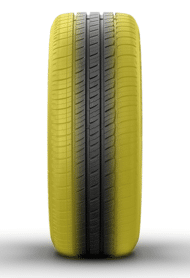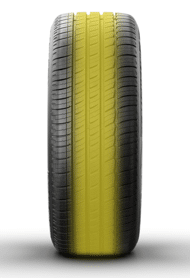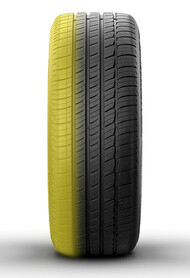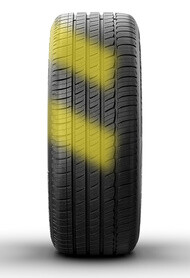
Tips & advice for car and suv tyres
It is normal for tyres in service to show progressive tyre wear over time. But sometimes, owing to specific conditions of use, tyres can exhibit abnormal or uneven tyre wear, which might reduce their service life. Eventually, some of the causes of uneven tyre wear could lead to a weakening of the tyre reinforcing structure, but before that, there could be other less obvious consequences, such as an increase in fuel consumption.
This article is about the causes of this excessive or uneven tyre wear, how to prevent them and how can you tell when it is time to change your tyres?
Causes of tyres wearing
Case 1 : Tyres wearing on outside (both edges) or Rounded Wear

Tyre wearing on outside edges or tread appears rounded
Excessive tyre wear on both edges, causing the tyre tread to look rounded rather than flat, can indicate underinflation. When the tyre is insufficiently inflated, the load in the contact patch on the road surface is not even. The central part of the contact patch is not correctly supported and the load is transfered more to the outside edges (also called shoulders). More load in the shoulders leads to more rapid tyre wear on outside edges.
An underinflated tyre tends to over flex and run warmer than normal. This accelerates rubber wear rate and increases rolling resistance, which in turn increases vehicle fuel consumption.
How to avoid excessive tyre wear on outside edges?
To prevent this abnormal wear from occurring, your tyre should be inflated to the recommended pressure, using a reliable pressure gauge and the pressure should be checked at least once a month when the tyres are at ambient temperature.
To find the recommended pressure, check your vehicle owner's manual or the sticker on the driver's door pillar.
Case 2 : Tyres wearing in the centre

Tyre wearing in the centre
Excessive tyre wear on the central part can indicate over-inflation.
If the tyre is over-inflated, it is the central part of the tread that supports most of the load and therefore wears out faster than the edges.
A small amount of centre wear, on rear tyres for example, could be a characteristic of the way that the vehicle manufacturer has set your vehicle up, but it is important to check
How to avoid excessive centre wear?
Check the tyre pressure when it is at ambient temperature using a reliable pressure gauge. Set the pressure to that recommended by your vehicle manufacturer.
To find the recommended pressure, check your vehicle owner's manual or the sticker on the driver's door pillar.
Case 3 : Tyre wearing on outside, tyres wearing on inside (only one edge) or tyre wear patterns

Tyre wearing on the outside
Tyre wearing on the inside (one edge)

Uneven or patchy Tyre wear patterns
Excessive wear on one side of the tyre or patchy, uneven tyre wear patterns may indicate a problem with the vehicle suspension. This kind of wear can occur when the alignment or camber geometry of the wheel is incorrect or when suspension components such as bushes or dampers are in poor condition.
Example of camber and alignment geometry choices

CAMBER

ALIGNMENT
How to correct suspension misalignment?
Have the geometry of your vehicle diagnosed by a professional who will be able to make the appropriate adjustment of the different angles and replace any damaged or worn components.
How do you know when the tyre needs to be changed?
There is a legally defined minimum tread depth for tyres. The remaining tyre tread depth for cars, vans and 4x4 vehicles must be at least 1.6 mm throughout a continuous band comprising the central ¾ of the breadth of the tread and round the entire circumference of the tyre.
As the wear approaches this threshold, the tyres need to be changed.

But beware:
- It is the responsibility of the driver to be sure that tyres are in road worthy condition. Using unroadworthy tyres can result in penalties for the driver.
- However, if you change your tyres before reaching the minimum allowable tread depth, you increase your vehicle running costs, waste and CO2 emissions
Fortunately, there is an easy way for you to determine if it is time to change your tyres.

Tyre wear indicator
A tyre wear indicator is a small raised rib 1.6mm high in the base of the main tread grooves at various intervals around the tyre tread.
When the height of the tread is flush with the tyre wear indicators, you know it's time to change your tyre.
In the outer areas (shoulders) there may be no tyre wear indicator. In this case, the legal constraint is not to have a slick sculpture.

How to locate a tyre wear indicator?
Tyre wear indicators are present across the tyre (usually in the main grooves) at various intervals around the tyre circumference.
For MICHELIN tyres, a small BIBENDUM logo on the sidewall makes it easier to locate tyre wear indicators.
Do your tyre wear indicators show that it is time to change your tyres?
Find the perfect tyre
Enter your vehicle or tyre size
We're searching for your tire...
Wait few seconds we're processing your photo

Find a tyre dealer near you
Search by
Address, City or ZIP code
Car
Locate me
Top 5 cities in Africa

